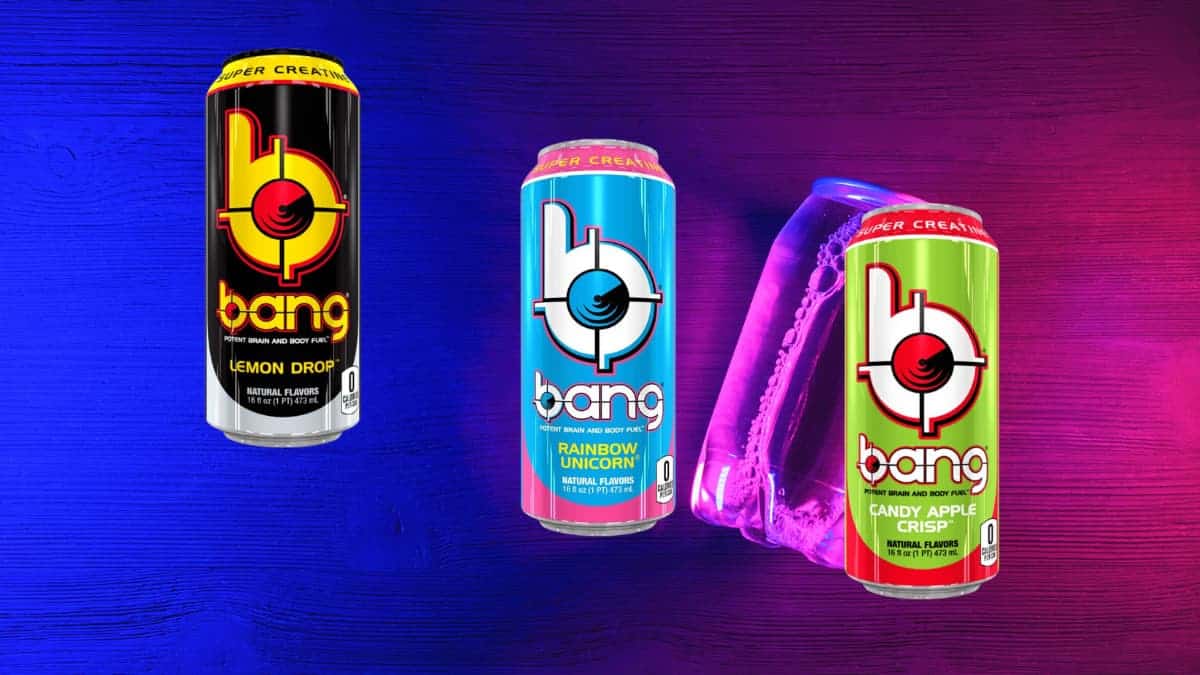How Much Caffeine in Bang Energy Drinks?
If you’re looking for a way to stay energized during a workout, you might be tempted to try a Bang Energy Drink. It offers a mega dose of caffeine and zero sugar, making it a popular option for a pre-workout burst of energy.
Should you down a Bang Energy drink to beat fatigue? Just how much caffeine is in a Bang Energy Drink?
Let’s talk about the possible health benefits and risks of something that gives you a boost yet has no sugar.

Key Takeaways: Caffeine In Bang Drinks
- Bang energy drinks have a high caffeine content.
- Most Bang energy drinks have no sugar.
- If you consume a Bang energy drink, you might want to cut out other sources of caffeine in your diet.
How Much Caffeine in Bang Energy Drinks
A 16-ounce Bang gives you 300 mg of caffeine. Most Bang beverages have no sugar and no calories. This feature is a major plus, especially when you compare them to other energy drink brands.
Let’s see how much caffeine is in a Bang compared to other brands of caffeinated drinks.
Bang Energy Caffeine Content vs Other Drinks
- A Red Bull has 150 mg of caffeine in one 16-oz can.
- The original Monster gives you 160 mg per 16 ounces. Monster Java goes up to 300 mg per can, similar to Bang.
- Celsius ranges from 100 to 300 mg of caffeine per 12-oz serving, depending on the variety of the drink.
Why Is Bang So Popular?
Bang is one of the fastest-growing energy drinks on the US market. Why is it so popular? This brand offers “potent brain & body fuel” to maximize concentration and workouts. In other words: a lot of caffeine.
Some people use Bang as a pre-workout drink. The hope is that it increases strength and endurance — crucial to building more muscle.
But scientific evidence supporting this usage remains limited.
The popularity of Bang energy drinks comes from a hip marketing culture.
Instead of verified health benefits, the cans feature brightly colored designs. Attractive youngsters populate the brand’s Instagram.
And the bizarre flavor names are downright fun. Blue Razz, Bangster Berry, Radical Skadattle, Rainbow Unicorn, Birthday Cake Bash, and Candy Apple Crisp — blast off!
Other Ingredients & Calories
Sugar Content
If you’re on a diet, you’ll be happy to know that this brand has zero calories and no sugar per serving. That’s certainly a huge benefit over other sugar-drenched energy drinks.
How do they create that sweet taste without upping the calorie content? Artificial sweeteners.
Each can has a long list of preservatives and other additives — things you might not want to put in your body. Especially if you’re an athlete.
Calorie Content
The calorie content is zero for most of their line, though you should check the label. For instance, their Keto coffee line has 130 calories.
But those calories don’t come from sugar, since there’s only about 1 gram in the Keto versions.
Does that mean that this type of drink has health benefits for your body? Well, not exactly. The low sugar content is fantastic. But there is another side to consuming these sweet-tasting cans.
Bang contains sucralose and acesulfame potassium. These artificial sweeteners can cause digestive problems. It’s up to you to decide if downing artificial sweeteners are the way you want to care for your health.
The caffeine in a cup of black coffee comes with zero calories or artificial ingredients. Just sayin’.
Super Creatine
Another ingredient in the drink is what Bang calls Super Creatine®. In reality, this additive is Creatyl-L-Leucine, a popular dietary supplement.
Bang claims that Super Creatine can enhance physical performance. However, no scientific or medical evidence exists to support this claim. So we don’t know if or how the body can absorb CLL to increase energy.
There are also safe limits to the consumption of creatine, but Bang isn’t clear about how much is in their cans.
Bang Energy Has a High Caffeine Content
Now let’s get to the reason that most people like this type of energy drink: the caffeine content.
As I mentioned, Bang in the United States currently contains 300 mg of caffeine. That’s at the high end of healthy caffeine consumption.
How much caffeine is safe? The FDA recommends an upper limit of 400 mg a day for healthy adults. Drinking two servings of Bang would put you way over this recommended limit.
If you combine even one can of Bang energy drink with a cup of coffee, chocolate, or some tea, you’re getting into dangerous territory.
Why should you limit how much caffeine you consume? High levels of caffeine can make you dizzy or interfere with sleep. Too much caffeine can make you sick. In some cases, you could even overdose on caffeine.
If you love the taste of Bang, you can get some flavors of this energy drink in a caffeine-free version.
Wrapping Up
Bang energy drink claims to benefit your health and increase mental focus. But most studies show that the effects are minimal or temporary, and the risks are high.
That’s part of the reason why Bang comes with warnings on the label. Yep, the can warns that minors, pregnant women, or people with any medical conditions should not consume this energy drink.
Bang also warns that it can cause heart palpitations, sleep interruption, and jitters. These are bad side effects for a drink that claims to be healthy.
So what should you do if you decide to drink a beverage with a high caffeine content? Limit your consumption of other caffeinated foods or beverages during that day. And stay alert for signs that you’ve surpassed your safe daily caffeine intake.

